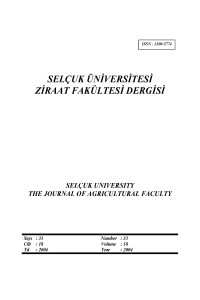The Effects of Different Cabinet Temperatures During Last Stage of Incubation on Hatching Traits of Different Egg Weight Groups in Broiler Hatching Eggs
Abstract
This study was conducted to investigate the effects of different cabinet temperatures during plateau and pip stages of embryo development and different egg weights produced by same flock (49 wks old age-Ross-308) on hatching traits in broiler. The eggs divided into three egg weight groups (55.01-60.00 g, 1st group, 60.01-65.00 g, 2nd. group and 65.01-70.00 g, 3rd group) and exposed to three different hatching cabinet temperatures during plateau and pip stages of incuba-tion. The temperatures were adjusted as 37.2 (KON), 38.3 (Y) and 39. 4 0C (ÇY) for cabinets during the study. The statisti-cal evaluation for egg components was carried on six eggs for each treatment group (totally 18 eggs) . The differences among groups for egg and albumen weights were found significant (P<0.01). The differences for yolk weights were found significant between first and other two groups and the yolk weight in group 1 decreased compared with other groups. No difference were found for albumen and yolk rates between 1 and 2 but for 3 treatment groups. In spite of incerasing albu-men rates in the eggs over 65 g , by contrast, the yolk rate decreased compared with other treatment groups. Prenatal and total late deaths increased and dependingly hatchability of over 65 g of eggs depressed when exposed to 37.2 0C cabinet temperature. Perinatal deaths at 39.4 0C were found significantly higher in group three than that of group 2. The results imply that the eggs over 65 g should be incubated at temperatures higher than 37.2 0C cabinet temperatures during plateau and pip stages of incubation. The temperature of Y group seems to be optimal for all egg weight groups.
Keywords
Broiler Kuluçkalık Yumurtalarında Çıkış Döneminde Uygulanan Farklı Kabin Sıcaklıklarının Farklı Ağırlıktaki Yumurtaların Kuluçka Sonuçlarına Etkileri
Abstract
Bu çalışma aynı sürüden elde edilen, farklı ağırlıktaki kuluçkalık yumurtaların, kuluçkanın plato ve pip (delme) döneminde farklı çıkış kabin sıcaklıklarına tepkilerini incelemek amacıyla planlanmıştır. Bu amaçla 49 haftalık yaştaki Ross-308 broiler sürüsünden elde edilen yumurtalar, 3 farklı ağırlık grubuna ayrılarak (55.01-60.00 g ,1. grup, 60.01-65.00 g , 2. grup ve 65.01-70.00 g, 3. grup ) kuluçkanın plato ve pip döneminde 37.2 (KON), 38.3 (Y) ve 39. 4 0C (ÇY) olmak üzere 3 farklı sıcaklık derecesine maruz bırakılmıştır. Deneme başlangıcında her bir grup için 6 yumurtada (toplam 18 yumurta) yapılan istatistiki değerlendirmede , yumurta ve ak ağırlıkları farklı bulunmuş, sarı ağırlığı bakımından 1. grupla diğer gruplar farklılık göstermiştir (P<0.01). Ak ve sarı oranları bakımından 1 ve 2 grup oranları arasındaki fark önemsiz bulunurken, 3. grupla diğer gruplar arasındaki farklar önemli bulunmuştur. 65 g’ın üstündeki yumurtalarda ak oranı artmasına rağmen sarı oranı diğer gruplara göre azalmıştır. Deneme sonuçlarına göre, 37.2 0C’ de inkübe edilen 3 numaralı yumurtalar, 1 numara ile gösterilen gruba göre toplam geç dönem ölümler ve prenatal ölümler bakımından daha yüksek bir ortalama göstermişler, bunlara bağlı olarak da ÇG ortalaması da düşük çıkmıştır (P<0.05). Perinatal ölümler bakımından, 39.4 0C sıcaklıkta, 2 ve 3 nolu grup ortalamaları arasındaki farklılık istatistiki olarak önemli bulunmuştur (P<0.01). Deneme, 65 g’ın üstündeki yumurtaların belirtilen periyotta 37.2 0C’ den daha yüksek sıcaklıklarda kuluçkalanması önerilebilir. Yumur-ta ağırlığı göz önüne alınmaksızın 38.3 0C’lik kabin sıcaklığı optimum olarak gözükmektedir.
Keywords
Details
| Primary Language | English |
|---|---|
| Subjects | Zootechny (Other) |
| Journal Section | Research Article |
| Authors | |
| Publication Date | June 25, 2004 |
| Submission Date | January 1, 2004 |
| Published in Issue | Year 2004 Volume: 18 Issue: 33 |
Selcuk Agricultural and Food Sciences is licensed under a Creative Commons Attribution-NonCommercial 4.0 International License (CC BY NC).


